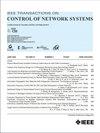Polyhedral Restrictions of Feasibility Regions in Optimal Power Flow for Distribution Networks
IF 4
3区 计算机科学
Q2 AUTOMATION & CONTROL SYSTEMS
引用次数: 0
Abstract
The optimal power flow (OPF) problem is one of the most fundamental problems in power system operations. The nonlinear ac power flow equations that model different physical laws (together with operational constraints) lay the foundation for the feasibility region of the OPF problem. While significant research has focused on convex relaxations, which are approaches to solve an OPF problem by enlarging the true feasibility region, the opposite approach of convex restrictions offers valuable insights as well. Convex restrictions, including polyhedral restrictions, reduce the true feasible region to a convex region, ensuring that it contains only feasible points. In this work, we develop a sequential optimization method that offers a scalable way to obtain (bounds on) solutions to OPF problems for distribution networks. To do so, we first develop sufficient conditions for the existence of feasible power flow solutions in the neighborhood of a specific (feasible) operating point in distribution networks; second, based on these conditions, we construct a polyhedral restriction of the feasibility region. Our numerical results demonstrate the efficacy of the sequential optimization method as an alternative to existing approaches to obtain (bounds on) solutions to OPF problems for distribution networks. By construction, the optimization problems within the defined restrictions can be solved in polynomial time and are guaranteed to have feasible solutions.配电网最优潮流可行性区域的多面体约束
最优潮流问题是电力系统运行中最基本的问题之一。模拟不同物理规律(以及运行约束)的非线性交流潮流方程为OPF问题的可行性域奠定了基础。虽然大量的研究集中在凸松弛上,这是一种通过扩大真实可行区域来解决OPF问题的方法,但凸限制的相反方法也提供了有价值的见解。凸约束,包括多面体约束,将真可行域简化为凸域,保证其只包含可行点。在这项工作中,我们开发了一种顺序优化方法,该方法提供了一种可扩展的方法来获得配电网络OPF问题的(边界)解。为此,我们首先建立了配电网中某一特定(可行)工作点附近存在可行潮流解的充分条件;其次,基于这些条件,构造了可行域的多面体约束。我们的数值结果证明了顺序优化方法作为一种替代现有方法的有效性,以获得配电网OPF问题的(边界)解。通过构造,限定条件下的优化问题可以在多项式时间内求解,并保证有可行解。
本文章由计算机程序翻译,如有差异,请以英文原文为准。
求助全文
约1分钟内获得全文
求助全文
来源期刊

IEEE Transactions on Control of Network Systems
Mathematics-Control and Optimization
CiteScore
7.80
自引率
7.10%
发文量
169
期刊介绍:
The IEEE Transactions on Control of Network Systems is committed to the timely publication of high-impact papers at the intersection of control systems and network science. In particular, the journal addresses research on the analysis, design and implementation of networked control systems, as well as control over networks. Relevant work includes the full spectrum from basic research on control systems to the design of engineering solutions for automatic control of, and over, networks. The topics covered by this journal include: Coordinated control and estimation over networks, Control and computation over sensor networks, Control under communication constraints, Control and performance analysis issues that arise in the dynamics of networks used in application areas such as communications, computers, transportation, manufacturing, Web ranking and aggregation, social networks, biology, power systems, economics, Synchronization of activities across a controlled network, Stability analysis of controlled networks, Analysis of networks as hybrid dynamical systems.
 求助内容:
求助内容: 应助结果提醒方式:
应助结果提醒方式:


